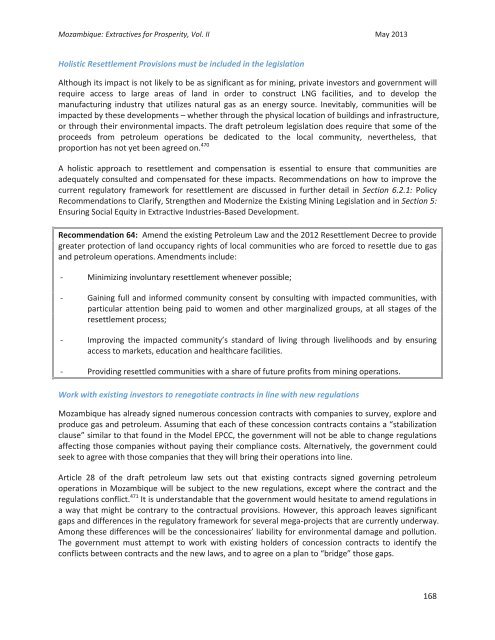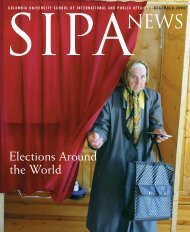Mozambique - School of International and Public Affairs - Columbia ...
Mozambique - School of International and Public Affairs - Columbia ...
Mozambique - School of International and Public Affairs - Columbia ...
You also want an ePaper? Increase the reach of your titles
YUMPU automatically turns print PDFs into web optimized ePapers that Google loves.
<strong>Mozambique</strong>: Extractives for Prosperity, Vol. II May 2013<br />
Holistic Resettlement Provisions must be included in the legislation<br />
Although its impact is not likely to be as significant as for mining, private investors <strong>and</strong> government will<br />
require access to large areas <strong>of</strong> l<strong>and</strong> in order to construct LNG facilities, <strong>and</strong> to develop the<br />
manufacturing industry that utilizes natural gas as an energy source. Inevitably, communities will be<br />
impacted by these developments – whether through the physical location <strong>of</strong> buildings <strong>and</strong> infrastructure,<br />
or through their environmental impacts. The draft petroleum legislation does require that some <strong>of</strong> the<br />
proceeds from petroleum operations be dedicated to the local community, nevertheless, that<br />
proportion has not yet been agreed on. 470<br />
A holistic approach to resettlement <strong>and</strong> compensation is essential to ensure that communities are<br />
adequately consulted <strong>and</strong> compensated for these impacts. Recommendations on how to improve the<br />
current regulatory framework for resettlement are discussed in further detail in Section 6.2.1: Policy<br />
Recommendations to Clarify, Strengthen <strong>and</strong> Modernize the Existing Mining Legislation <strong>and</strong> in Section 5:<br />
Ensuring Social Equity in Extractive Industries-Based Development.<br />
Recommendation 64: Amend the existing Petroleum Law <strong>and</strong> the 2012 Resettlement Decree to provide<br />
greater protection <strong>of</strong> l<strong>and</strong> occupancy rights <strong>of</strong> local communities who are forced to resettle due to gas<br />
<strong>and</strong> petroleum operations. Amendments include:<br />
- Minimizing involuntary resettlement whenever possible;<br />
- Gaining full <strong>and</strong> informed community consent by consulting with impacted communities, with<br />
particular attention being paid to women <strong>and</strong> other marginalized groups, at all stages <strong>of</strong> the<br />
resettlement process;<br />
- Improving the impacted community’s st<strong>and</strong>ard <strong>of</strong> living through livelihoods <strong>and</strong> by ensuring<br />
access to markets, education <strong>and</strong> healthcare facilities.<br />
- Providing resettled communities with a share <strong>of</strong> future pr<strong>of</strong>its from mining operations.<br />
Work with existing investors to renegotiate contracts in line with new regulations<br />
<strong>Mozambique</strong> has already signed numerous concession contracts with companies to survey, explore <strong>and</strong><br />
produce gas <strong>and</strong> petroleum. Assuming that each <strong>of</strong> these concession contracts contains a “stabilization<br />
clause” similar to that found in the Model EPCC, the government will not be able to change regulations<br />
affecting those companies without paying their compliance costs. Alternatively, the government could<br />
seek to agree with those companies that they will bring their operations into line.<br />
Article 28 <strong>of</strong> the draft petroleum law sets out that existing contracts signed governing petroleum<br />
operations in <strong>Mozambique</strong> will be subject to the new regulations, except where the contract <strong>and</strong> the<br />
regulations conflict. 471 It is underst<strong>and</strong>able that the government would hesitate to amend regulations in<br />
a way that might be contrary to the contractual provisions. However, this approach leaves significant<br />
gaps <strong>and</strong> differences in the regulatory framework for several mega-projects that are currently underway.<br />
Among these differences will be the concessionaires’ liability for environmental damage <strong>and</strong> pollution.<br />
The government must attempt to work with existing holders <strong>of</strong> concession contracts to identify the<br />
conflicts between contracts <strong>and</strong> the new laws, <strong>and</strong> to agree on a plan to “bridge” those gaps.<br />
168

















